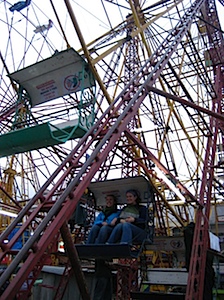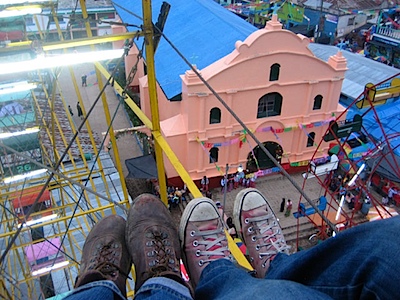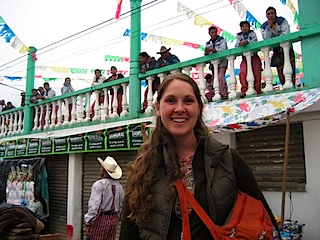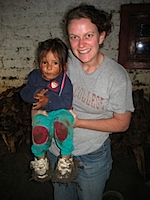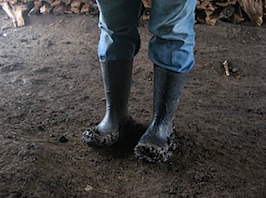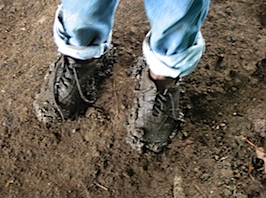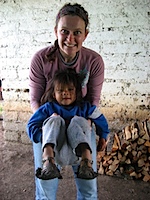Lately, LOTS of things have been going on. Though we both like our posts to be themed, sometimes everything we want to tell you doesn’t fit together in a neat little package, thus today is Random Updates day covering things past, present and future.
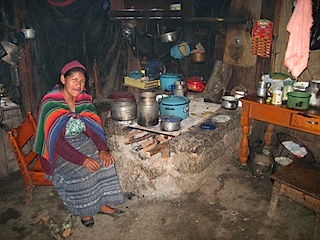 Not too long ago we went to visit Maria, the patient with the prolapse that went to the Huehue medical jornada with Fletch. We’ve actually seen her twice, once about a week after her surgery and then again last week while doing house surveys. The first time we went to visit along with the local Health Committee to see how she was doing. It was nearly dusk when we arrived, and the house has no electricity. They brought out stools for all of us to sit on in the room where Maria was resting. Her parents came in with candles and sat with us, and her husband came in and stood by her, adjusting the knit cap on her head. The folks here believe strongly that if your body is trying to heal any ailment you need to keep it hot–not just warm, but HOT–and eat things that warm the body, like chile and hot drinks. We asked her how she was doing. Her husband answered–the same husband who originally told her if she went to have the surgery she should also find him a replacement wife on her way out of town. Except with the response that came out of his mouth and the way he was acting in front of us, I had a hard time believing he could be the same person. He smiled shyly, excitedly, “She’s doing so much better, ” he tugged her cap down carefully, tighter over her ears. “The doctors said it would be best for her to bathe every day so she’s just finished bathing in the chuj. And she’s eating, ” he said excitedly. “She hasn’t eaten in so long. Before she always said it hurt her too much to eat. She’s hungry now and she eats well at every meal.” He was so happy. Maria looked to be resting as comfortably as possible for just having undergone and operation. She smiled slightly and nodded in agreement with what he said.
Not too long ago we went to visit Maria, the patient with the prolapse that went to the Huehue medical jornada with Fletch. We’ve actually seen her twice, once about a week after her surgery and then again last week while doing house surveys. The first time we went to visit along with the local Health Committee to see how she was doing. It was nearly dusk when we arrived, and the house has no electricity. They brought out stools for all of us to sit on in the room where Maria was resting. Her parents came in with candles and sat with us, and her husband came in and stood by her, adjusting the knit cap on her head. The folks here believe strongly that if your body is trying to heal any ailment you need to keep it hot–not just warm, but HOT–and eat things that warm the body, like chile and hot drinks. We asked her how she was doing. Her husband answered–the same husband who originally told her if she went to have the surgery she should also find him a replacement wife on her way out of town. Except with the response that came out of his mouth and the way he was acting in front of us, I had a hard time believing he could be the same person. He smiled shyly, excitedly, “She’s doing so much better, ” he tugged her cap down carefully, tighter over her ears. “The doctors said it would be best for her to bathe every day so she’s just finished bathing in the chuj. And she’s eating, ” he said excitedly. “She hasn’t eaten in so long. Before she always said it hurt her too much to eat. She’s hungry now and she eats well at every meal.” He was so happy. Maria looked to be resting as comfortably as possible for just having undergone and operation. She smiled slightly and nodded in agreement with what he said.
Readers should understand that couples do not show affection openly in Mayan communities. There is no hand holding, no interlaced arms. There’s definitely no kissing or hugging. It took us months to figure out who was married to who in town because most of the time husbands and wives don’t even stand next to one another in public. When I saw Jose leaning over Maria and carefully adjusting her cap, it felt like one of the most intimate exchanges I’ve ever witnessed here. And it struck me that I had underestimated how paralyzing their fear and lack of education can be. The word impotent came to mind. This man was so incapable of helping his wife himself or understanding how to help her on his own. He was probably immensely frustrated and scared. Suddenly I felt like a bit of a jerk, actually, that I had expected so much of them when they were resistant to let her go for the operation.
I think one of the greatest challenges of this job is trying, really sincerely, to empathize with the people with and for whom we work. Their world view and experience is so drastically different from ours. I was so struck by the misogynist tone of her husband’s initial reaction to the idea of an operation that it kept me from really understanding where he was coming from. I figured fear was a big part of the family’s hesitation, and I addressed that at length both when I talked to her mother-in-law and her father and again when Jose came to visit our house. But I didn’t get it, not all the way. Not until I was sitting in the near dark of their cramped house, kids running around in the next room, smoke billowing out of their kitchen stove, did I understand how much fear they have to overcome to leave here where they understand things in their own way. How much fear they have to overcome to go to the city where they can hardly communicate with anyone, and the fear that perhaps borders terror of letting some foreign doctor cut them open and mess with their body parts.
Manuel, president of the health committee, asked us if we had anything to say to the family. I thanked them, her parents, her husband and Maria herself for trusting us. I told them I appreciated their courage in doing something that was very difficult for all of them financially and personally, so that Maria could be well. Finally, I requested that they not hesitate to talk to their neighbors, family, and friends about their experience. “I know that people here are not accustomed to seeing doctors or having operations. How could they be when these services have only been available in the recent past? But because you all trusted us and you took Maria to have this operation, you can see how it has improved her well being in just a week, and you’ll continue to see her improvement. Please, share this experience with others who are suffering. Encourage them to seek help. There are illnesses that don’t have any cure, but there are many ailments that can be cured or helped with medicines or small operations. In January there will be another group of doctors coming to do the same health work. If you could do us the favor of telling people about your positive experience if they ask so that they are less afraid to seek help I would appreciate that very much, and again, thank you for trusting us.”
I felt very positive leaving their house in the dark and climbing our way slowly out of the valley and back up to our house. Maria seems to have recuperated very well. Since that visit we’ve had 4 or 5 families come to our door asking for help, most of them with the same problem as Maria. We’ll see who all goes to Huehue in January…
Fletch’s Todos Santos post had my approval before going up, so I won’t spend a lot of time on it. One of our best PCV friends, Anne, decided to use the few days before the feria in Todos Santos to come all the way out to our site to visit us. We had a great time with her here, and as we started to start pack I felt a really torn. I wished we hadn’t committed to going to Todos Santos. I felt like maybe we really should just stay at home and hang out with our host family. But, as I mentioned, we’d already committed to going, so I went, somewhat begrudgingly.
In my head I’d expected very nice weather. Although the rainy season was supposed to have started way back in July, we haven’t had much rain at all. On our climb up the mountain the rain started. Our packs were getting soaked on top of the bus…should’ve stayed home, I thought. But we were already on the way. We lucked out switching buses. We got off at Tres Caminos just as a Todos Santos bus with 4 seats (for five of us, close enough…) approached. We packed ourselves in. The ride was misty and fogged in the whole way down into the valley so we couldn’t see much of anything. Everyone was quiet. We lumbered down the gravel roads. The young Todo Santero sitting next to me fell asleep, and his straw hat rolled off his head and into my lap. He’d said the trip would take about an hour, but it felt like no time at all before we were pulled into town.
We got out of the micro and put on our wet packs, and looked up to see something overwhelming. There were stripes everywhere. Men in striped red pants, with striped white shirts, women with striped blue cortes, everyone wearing straw hats with a blue band striping around their heads. It’s pretty different to be in a place where EVERYONE wears traje. There were infant boys tied to their mother’s backs already wearing the tailored striped shirts and red pants. And all of the sudden I felt like I was on vacation. We headed down the street to meet our PCV host and see our room. I’d forgotten about the weight that comes off when we leave site. Usually it take me until the downslope of the Cuchumatanes into Chiantla to feel like we’re going somewhere so I can relax. Todos Santos is in the cumbre, one of the villages on top of the mountains, so I never hit the downslope. As we walked through the streets more and more gringos appeared. I was excited to see other volunteers!
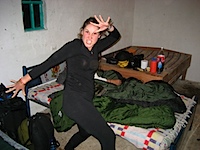 The thing is, there are a lot of really cool volunteers here, but we all live spread out and far away, so after our initial 3 months spent mostly together, we don’t get to see each other very often. We dropped off our packs in the little concrete room full of beds where six of us were sharing a room, and headed down to the central park. More volunteers! We decided we’d dig into the fair food: french fries, fried chicken, taquitos. I would never have done such thing six months ago, but I think my body has mostly adjusted to the food here. I get sick, I get better. It never seems to matter what I do or don’t do. The only precaution I take is telling the taquito vendors to hold the cabbage–it’s the only thing not exposed to heat and who knows if it was a) washed at all b) washed with clean water c) cut with a clean knife. The whole thing had the pleasant feeling of a cultural vacation with lots of people I already know and like. I was so excited I had to go ride the ferris wheel with my friend Charlotte. We had a good view of the town from up there.
The thing is, there are a lot of really cool volunteers here, but we all live spread out and far away, so after our initial 3 months spent mostly together, we don’t get to see each other very often. We dropped off our packs in the little concrete room full of beds where six of us were sharing a room, and headed down to the central park. More volunteers! We decided we’d dig into the fair food: french fries, fried chicken, taquitos. I would never have done such thing six months ago, but I think my body has mostly adjusted to the food here. I get sick, I get better. It never seems to matter what I do or don’t do. The only precaution I take is telling the taquito vendors to hold the cabbage–it’s the only thing not exposed to heat and who knows if it was a) washed at all b) washed with clean water c) cut with a clean knife. The whole thing had the pleasant feeling of a cultural vacation with lots of people I already know and like. I was so excited I had to go ride the ferris wheel with my friend Charlotte. We had a good view of the town from up there.
Something that never ceases to make me laugh when we volunteers get together is how, after hours spent on buses getting from place to place, we are a little slap happy/somewhat joggled and incoherent, which means that ridiculous things come out of our mouths. My favorite quote of the whole trip had to be when a friend was trying to point someone out in the horse race crowd and said, “Ok, so you see that guy in the red pants?” This picture is of our friend Ann. Can you spot the guy in the red pants? To be fair, the man she was pointing out had a different shade of red on his pants, but when she said it, I looked at a crowd of guys like the one in this picture. I was dying laughing.
The horse race was pretty interesting. We watched almost all day long. It was cool to have sort of an inside outsider view of events. I mean, we (PCVs who work with them) have a lot more experience with Mayans and their culture than the regular tourist, but each linguistic/cultural group has its differences. We talked to a lot of Todo Santeros watching the race, and it was sort of shocking how open they were about deaths in the horse races. Their fatalistic view is something we experience all the time, but we’ve never experienced that fatalism turned into a spectator sport. They were all very nonchalant like, “Yeah, people die here. Sometimes more than one man dies. But it’s good for the crops.” There seemed to be no hint of sadness in their commentary. And this all contrasted sharply with the ending of the race.
We’d heard the stop time was 5pm, and I think most of us thought there would be some sort of official ending. Not so. When the rider who slammed the fence post in front of us was knocked off his horse and unconscious it was a little after 4:30. I’d been eating copious amounts of french fries since we were standing right next to one of the vendors and I felt instantly sick to my stomach. The whole atmosphere in the crowd turned tense and curious and fearful. Had the man died? Was he going to die? It was an astoundingly hard hit. The race officials dragged the unconscious man off the track and blew their whistles up and down the track. Just like that, the race ended. A crowd formed around the man, and we tried to stay out of it, waiting for a space to squeeze past and leave the track area. It was as though no one minded flirting with death all day long. Death could be a nonchalant thing, that is until there was a real possibility of someone dying. I agree with Fletch’s assessment that there was more to the race than drunken absurdity. I did feel like there was some intangible need for them to perform this race. But I was sort of shocked by the change in tone before and after the last rider’s accident of the day. And when we saw that he was up and walking, a crowd walking around him, it seemed everyone was rather relieved to have escaped a death in the end.
The whole thing was a very strange experience, but seeing Todos Santos and the friends who understand our lives the most for the time being, was really good. I’m glad we went. On Monday morning the coaster bus (for 24 people) was packed almost entirely with tourists, including quite a few PCV’s. I didn’t get a good count on the number of people in the bus, especially since the inside was so full of people that quite a few tourists were seated on the luggage rack above the bus. For the first time all weekend it wasn’t raining or foggy. The coasters have huge windows, and being smooshed up against one gave me a great view of the valley. I love the Cumbre. I think it’s one of the most beautiful places in Guatemala. While the bus had to unload almost all the passengers 4 times to make it up some of the steeper hills, I was sitting in the far back corner under my hiking pack. I stayed seated and enjoyed the ride, contemplating all the different stories I’ve been told about Todos Santos and how rapidly the area has changed in the last 25-30 years and wondering in what ways it will continue to change.
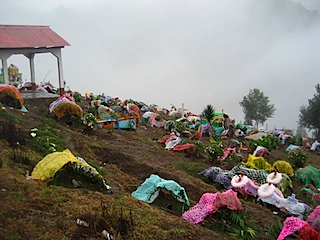 Sitting on the side of the highway with Katal and Nico, the other two volunteers from our area, it started to rain again. There was hardly any transport on Monday, due to most folks still hanging about the cemeteries with their families, but we did manage to find a not very crowded micro most of the way home, and then paid the guy extra to bring us all the way back to our municipio. It was raining, muddy, and foggy when arrived home, and it stayed that way for the rest of the week. Here is a picture of our local campo santo, which literally translates to “holy field”, decorated for All Saints Day against the almost white-out fog.
Sitting on the side of the highway with Katal and Nico, the other two volunteers from our area, it started to rain again. There was hardly any transport on Monday, due to most folks still hanging about the cemeteries with their families, but we did manage to find a not very crowded micro most of the way home, and then paid the guy extra to bring us all the way back to our municipio. It was raining, muddy, and foggy when arrived home, and it stayed that way for the rest of the week. Here is a picture of our local campo santo, which literally translates to “holy field”, decorated for All Saints Day against the almost white-out fog.
I really like the rain here. I like the fog running through the valley and up the mountainside. It’s all very mysterious and beautiful in its own way. Last year, when it rained for the better part of the first six month we were here, I was only annoyed that I couldn’t warm up enough to enjoy the weather. This year we’ve had far less rain until this week, and the presence of our stove makes all the difference. We can go wash dishes and clothes in the rain, then come inside where it’s warm. We can take walks in the rain, and then come inside where it’s warm. Our clothes take about 3 days to dry as opposed to two weeks.
I’d say the only down side to the rain is all the mud. It’s unbelievable here. The ground is full of clay, so the mud is thick and sticky. Walking anywhere turns into a huge chore, yanking your feet from the mud’s grasp with every step. Our shoes almost double in size with all the mud attached to them. I’ve seen toddlers, well, toddle a few steps in the mud, and with the extra attachment of mud on their shoes, lose their balance and fall over. It’s kind of funny, but then I think of the mothers and sisters and aunts who have to wash all those clothes. I feel like our clothes are muddy enough and we usually make it through the day without falling over. Though yesterday I was trying to carry a bench up a hill, and after I managed not to fall over as I slid a whole 3 feet backward, the next step I took my boot was literally sucked off my foot and my stocking foot landed in the mud. It’s so ridiculous sometimes I have to laugh. But it does get tiring after a while, this feeling of always being dirty. Mud flies up on you not matter how carefully you walk. It streaks your pants it and sometimes flies up on your hands, transfers to your shirt. We change our shoes at the door, but somehow so much mud still makes its way into our tiny clubhouse. It all makes me marvel at the wonders of sidewalks and pavement. I’m not a fan of expansive black top parking lots, but some pavement and strategically located sidewalks are something I don’t think Americans appreciate enough. Look at all this mud! And this doesn’t begin to describe how it feels slogging through it.
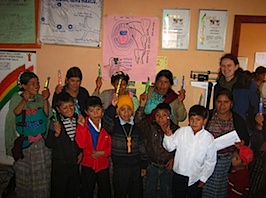 As I mentioned a few posts back, I’ve started working much more closely with the local nurses to give health talks to the women who benefit from a fairly new national wellfare program called Mi Familia Progressa. This week the nurses had three days full of vaccinations for different communities. Lucia, the nurse, asked me to talk about Oral Hygiene. This was, unbeknownst to her, a perfect opportunity for me to fulfill a promise. You see, while on vacation in Tikal with The 4 Witches, we spent the incredibly hot afternoons floating in the hotel pool where we met and talked with various other guests. A couple enjoying the lounge chairs overheard us talking about being Peace Corps Volunteers, and mentioned to us that they’d brought their kids to Guatemala to study Spanish. The kids had come the year before and were struck with the poverty they saw (the mother of the couple is a doctor, the father a lawyer, and the kids have grown up in the states, so it is pretty shocking). During their first and second visit to Guatemala the kids collected things to bring back to Guatemala. I remember the specific mention of soccer balls so that the local kids could have a real ball instead of the cheap plastic balls that are common here. Then the father asked, “Say, could you guys use some toothbrushes?” Hmmm, what did he mean? “We brought a lot of toothbrushes to give to kids here, but we still have a bag full of them and I don’t want to take them back to the states. Could you guys use them?” We said we could figure out a way to use them and he gave us his business card and said, “We just ask for some pictures in return.” This week I gave 3 oral hygiene health talks on why we should brush our teeth and how to do it properly. Each charla ended by singing a silly toothbrush song and those who participated with the most gusto were awarded toothbrushes. Here are the pictures…Thanks for the toothbrushes, guys! 🙂
As I mentioned a few posts back, I’ve started working much more closely with the local nurses to give health talks to the women who benefit from a fairly new national wellfare program called Mi Familia Progressa. This week the nurses had three days full of vaccinations for different communities. Lucia, the nurse, asked me to talk about Oral Hygiene. This was, unbeknownst to her, a perfect opportunity for me to fulfill a promise. You see, while on vacation in Tikal with The 4 Witches, we spent the incredibly hot afternoons floating in the hotel pool where we met and talked with various other guests. A couple enjoying the lounge chairs overheard us talking about being Peace Corps Volunteers, and mentioned to us that they’d brought their kids to Guatemala to study Spanish. The kids had come the year before and were struck with the poverty they saw (the mother of the couple is a doctor, the father a lawyer, and the kids have grown up in the states, so it is pretty shocking). During their first and second visit to Guatemala the kids collected things to bring back to Guatemala. I remember the specific mention of soccer balls so that the local kids could have a real ball instead of the cheap plastic balls that are common here. Then the father asked, “Say, could you guys use some toothbrushes?” Hmmm, what did he mean? “We brought a lot of toothbrushes to give to kids here, but we still have a bag full of them and I don’t want to take them back to the states. Could you guys use them?” We said we could figure out a way to use them and he gave us his business card and said, “We just ask for some pictures in return.” This week I gave 3 oral hygiene health talks on why we should brush our teeth and how to do it properly. Each charla ended by singing a silly toothbrush song and those who participated with the most gusto were awarded toothbrushes. Here are the pictures…Thanks for the toothbrushes, guys! 🙂
This week was a crazy busy week all in all. We did 4 health talks, finished house visits, and planned and promoted quite a few upcoming activities. Really only one thing went awry. We attempted to have a leaders’ meeting to figure out the next steps for our SPA project since we’ve finished house visits. This meant that Fletch and I worked for hours to put together all the data we’d collected and then work up a reasonable agenda for the leaders and give them homework to complete while we’re gone. They’d decided on Tuesday they wanted to have a meeting at 4pm on Saturday. So yesterday we cleaned the house, stoked the fire, made a snack for all of them. I had water on to make coffee as soon as everyone had arrived. It was raining so I thought people were just slow in making their way over. No. Three of 12 leaders showed up and then we went and harrassed Manuel until he came over. It was the only time during an intense week I felt very close to losing my cool. “Where is everyone?” we asked. Manuel responded, “It’s Saturday night, everyone’s bathing in the chuj by this time on Saturday night,” as the rest nodded their heads in agreement. “Alright, well, can I ask why you all scheduled a meeting at a time you knew no one would show up?” They all looked at their shoes, someone mumbled a saber, “Who knows…” We couldn’t go through the tons of material we’d planned to talk about without at least a majority of the leaders. I guess everything had been falling in to place so well up to this point, and I was so ready to give the information and be done with it after working on it until 9pm on a Friday night. I felt really disrespected and I had to check myself. I don’t think they mean to be disrespectful, but it was aggravating. We accomplished a few things, but all of it has to repeated at the newly scheduled leaders meeting on Monday at 4. Here’s hoping people show up so things aren’t just left hanging in our absence.
Funny, we planned our upcoming vacation to the states when nothing was happening and nothing was on the calendar. I guess we made ourselves seem scarce and then everybody wanted us and things started happening. Here’s what’s going on:
While we’re away there is an APROFAM medical jornada in Santa Eulalia as a result of the ALAS presentation we did for the local midwives. APROFAM is an organization that offers a variety of health services, but most of them have to do with family planning, so they’ll be in Santa Eulalia offering tubal ligations, vasectomies, IUD’s, and jadelle implants as well gynological exams, health consultations for children and cardiogram tests all at a very affordable price. For example, tubal ligations and vasectomies cost 25 quetzales, so about $3, and the patients can spend the night at home (which is a pretty big deal for these folks; they don’t like to spend much time away from home). Gyno and children consultations will cost 1 quetzal. At first I was a little sad I wouldn’t be here for the day, but then I thought, maybe it’s better this way. They don’t need me to do anything for them. Additionally I figure it’s better for me, as a representative of Peace Corps not to be too visibly involved with family planning services. APROFAM has encountered resistance in communities similar to that encountered by Planned Parenthood in different communities in the US. If Peace Corps Volunteers aren’t present, then people won’t get the wrong idea about what Peace Corps is and what they do. As delicate a subject as family planning can be, we have both had men and women approach us asking for help and ideas. We could only give them ideas and information. Now I’m really happy that families in the area will have an opportunity to help themselves to services we can not and do not provide.
The next big event in the works is a Feria de Salud that will take place just days after we return from vacation. December 1 is World AIDS Day, but we’ll be traveling that day. December 5 marks the two year anniversary of the inauguration of our local health post, but that’s a Saturday when the nurses won’t be here. So on Monday December 7 we’re having a big Health Fair, with AIDS education activities, a community prayer service for those who’ve died of AIDS and those living with the disease. And the best part?! December 7 is the day that everyone burns an effigy of the devil (*i think* as a part of their advent celebrations and making way for Christ even though it sounds like a sort of heathen tradition), so we’re burning the devil in the schoolyard. As a way to reinforce the fact that stopping the spread of HIV/AIDS is the responsibility of men and women alike, not just one or the other, instead of burning one devil we’re burning TWO, a male devil and a female devil. There will be music and snacks after that. But again, to reinforce the talks we’ve given on trash in the community, you only get to enjoy the tasty atol snack if you bring your own non-disposable cup. The leaders have decided that December 1 is community clean-up day so they’ll all be on board with the no-trash plan. The nurses came over to our house to start planning a few simple activities, and the four of us got so excited we just kept adding one thing to another until we had this half day celebration all planned out. It’s a good time for it though, as the kids are out of school and December is generally a very slow month for activities. It’s going to be such a lot of work as far as the educational activities go that we’re calling in reinforcement PCV’s, Katal and Nico, to help for the day. It should be interesting. Look for the report here in a month or so.
Two days after that we have yet another all-day activity. We’ve contacted an employee from the Ministry of Agriculture to come up to our village to talk to two of our local communities about the importance of chicken vaccinations. They will be giving out chicken vaccines out all day as well as teaching the community how to plan, organize and carry out their own vaccination campaigns in the future. In the morning we’ll be doing it in our village, and in the afternoon we’ll be going to the Yulais, our second community. Go food security! A lot of people in both communities have asked us for help in this matter when we’ve taken surveys about what they want from us. So again, it feels good to be accomplishing things the people have asked us for.
Finally, the following day we have a half day activity in a new community where we’ve never worked before. The community leaders saw us talk at a county-wide meeting and asked our counterpart if we could come give a half day seminar on preventing Maternal Mortality. We agreed to it instantly, we were so thrilled they asked for help. December, at least the first two weeks of it, will not be a down month for us. A funny side note to all of this–our local counterpart is supposedly enjoying his annual vacation at the moment, except that we have called him every day, or sometimes three times a day for the last week regarding all the plans in the works for this and other events. I think he’s probably glad we’re going on vacation so that we’ll leave him alone, but he’s been a great sport about it and always supportive.
It seems things have totally turned around from what they were in August and September. I’m pretty happy about that. Tomorrow we begin our long haul to the airport for Thanksgiving trip home. It sounds so cheezy, but seriously, there aren’t words to describe all the things I feel thankful for this year. We’ll be giving lots of presentations to different groups while we’re home; hopefully they’ll get a little taste of what they have to be thankful for as well. To all of you at home, SEE YOU SOON! And to our faithful readers, see in a few weeks. Happy Thanksgiving, everyone.
